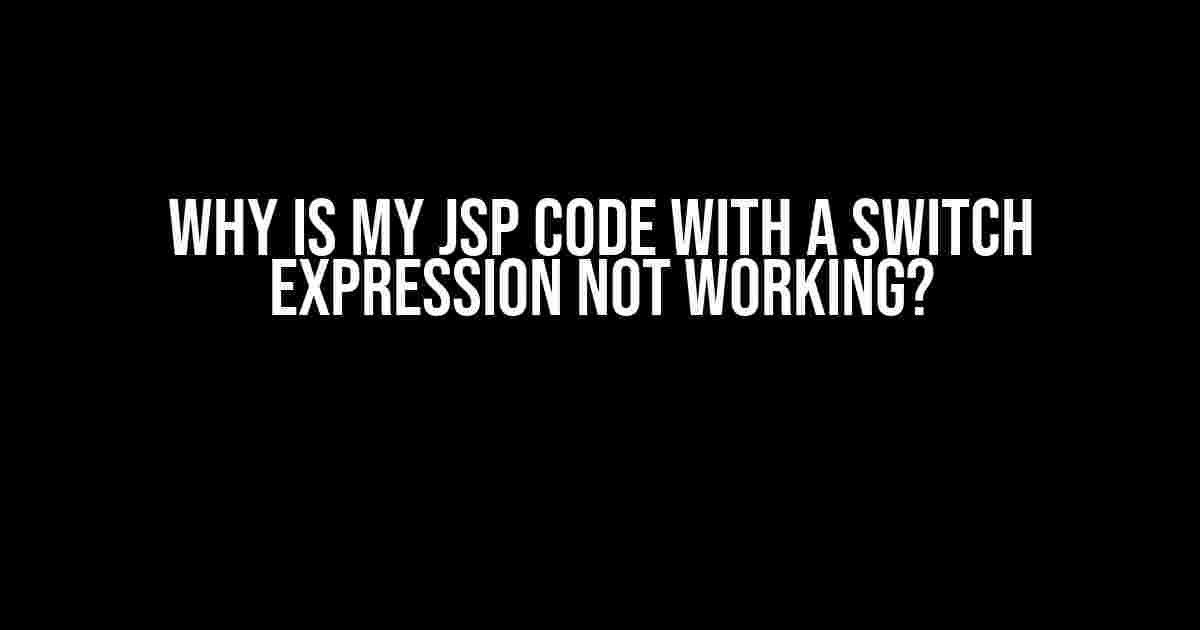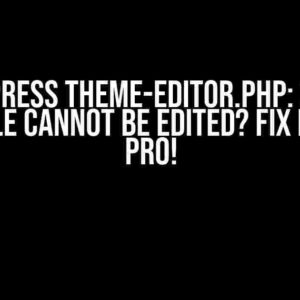Are you frustrated with your JSP code that refuses to work with a switch expression? Don’t worry, you’re not alone! In this article, we’ll dive into the common issues and provide you with actionable solutions to get your code up and running.
What is a Switch Expression in JSP?
A switch expression in JSP is a type of expression that allows you to evaluate an expression and execute different blocks of code based on the value of the expression. It’s a concise way to handle multiple possibilities in your code. The syntax for a switch expression in JSP is as follows:
<%= switch (expression) {
case value1:
// code block 1
break;
case value2:
// code block 2
break;
default:
// default code block
}>
Common Issues with Switch Expressions in JSP
Now that we’ve covered the basics of switch expressions, let’s explore some common issues that might be causing your code to fail.
Issue 1: Incorrect Syntax
The most common reason for a switch expression not working is incorrect syntax. Make sure you’re using the correct syntax, as shown above. A single mistake, such as a missing break statement or incorrect case value, can cause the entire expression to fail.
- Double-check your code for any typos or syntax errors.
- Use an IDE or code editor that highlights syntax errors to help you catch mistakes.
Issue 2: Incompatible Data Types
Another common issue is trying to use a switch expression with incompatible data types. For example, if your expression evaluates to a string, you can’t use it with case values that are integers.
For example, this code will not work:
<%= switch ("hello") {
case 1:
// code block 1
break;
case 2:
// code block 2
break;
default:
// default code block
}>
Instead, you need to use case values that match the data type of the expression:
<%= switch ("hello") {
case "hello":
// code block 1
break;
case "world":
// code block 2
break;
default:
// default code block
}>
- Make sure the data type of your expression matches the data type of your case values.
- Use the correct data type for your case values, such as strings for strings or integers for integers.
Issue 3: Missing Default Case
A default case is essential in a switch expression, as it specifies what to do when none of the case values match the expression. If you omit the default case, your code will throw a compile-time error.
For example, this code will not work:
<%= switch (expression) {
case value1:
// code block 1
break;
case value2:
// code block 2
break;
}>
Instead, you need to add a default case:
<%= switch (expression) {
case value1:
// code block 1
break;
case value2:
// code block 2
break;
default:
// default code block
}>
- Always include a default case in your switch expression.
- The default case should specify what to do when none of the case values match the expression.
Solutions to Common Issues
Now that we’ve covered the common issues, let’s dive into some solutions to get your code working.
Solution 1: Use a Switch Statement Instead
If you’re having trouble with a switch expression, try using a switch statement instead. A switch statement is similar to a switch expression, but it uses a more traditional syntax.
<% switch (expression) {
case value1:
// code block 1
break;
case value2:
// code block 2
break;
default:
// default code block
}%>
- Try replacing your switch expression with a switch statement.
- A switch statement can be a more readable and maintainable alternative to a switch expression.
Solution 2: Use an If-Else Statement Instead
Another solution is to use an if-else statement instead of a switch expression. This can be particularly useful when you have a small number of case values.
<% if (expression == value1) { %>
// code block 1
<% } else if (expression == value2) { %>
// code block 2
<% } else { %>
// default code block
<% } %>
- Try replacing your switch expression with an if-else statement.
- An if-else statement can be a more flexible and readable alternative to a switch expression.
Bonus Tip: Using Enums with Switch Expressions
If you’re working with enums, you can use them with switch expressions to make your code more concise and readable.
public enum Color {
RED, GREEN, BLUE
}
<%= switch (color) {
case RED:
// code block 1
break;
case GREEN:
// code block 2
break;
case BLUE:
// code block 3
break;
default:
// default code block
}>
- Use enums with switch expressions to make your code more concise and readable.
- Enums can help you avoid magic numbers and make your code more maintainable.
Conclusion
In this article, we’ve covered the common issues that might be causing your JSP code with a switch expression to fail. We’ve also provided actionable solutions to get your code working, including using a switch statement or an if-else statement instead. By following these tips and best practices, you can write more effective and maintainable code.
Remember to double-check your syntax, use compatible data types, and include a default case in your switch expression. With a little practice and patience, you’ll be writing switch expressions like a pro!
| Issue | Solution |
|---|---|
| Incorrect Syntax | Double-check your code for syntax errors |
| Incompatible Data Types | Use compatible data types for your case values |
| Missing Default Case | Always include a default case in your switch expression |
| Trouble with Switch Expressions | Try using a switch statement or if-else statement instead |
By following these best practices, you can write more effective and maintainable code. Happy coding!
Frequently Asked Question
Struggling with switch expressions in JSP? Don’t worry, we’ve got you covered!
Why is my JSP code with a switch expression not working?
Hey there! Are you using the correct Java version? Switch expressions are a Java 12 feature, so make sure you’re running on the right version. Also, ensure that your JSP compiler and server are configured to support Java 12.
Have I missed a import statement or a syntax error?
Good thinking! Double-check that you’ve imported the necessary package and that your syntax is spot on. In JSP, switch expressions need to be wrapped in a scriptlet (<% … %>), and the expression itself should be enclosed in parentheses. For example: <% switch (myVar) { … } %>.
Is the switch expression compatible with my JSP version?
You might be using an older JSP version that doesn’t support switch expressions. Make sure your JSP version is compatible with Java 12 features. If you’re stuck on an older version, consider upgrading or using alternative coding approaches.
How do I troubleshoot the issue further?
Debugging time! Enable debugging in your JSP compiler and server to get more detailed error messages. You can also try breaking down the switch expression into smaller parts to isolate the problematic code. Additionally, consult the JSP and Java documentation for more information on switch expressions and their usage.
Are there any alternative approaches to achieve the same result?
If all else fails, don’t worry! You can still achieve the desired outcome using traditional if-else statements or other alternative approaches. Consider using a ternary operator or a Map to simplify your code. Remember, there’s always more than one way to skin a cat (or solve a coding problem)!



